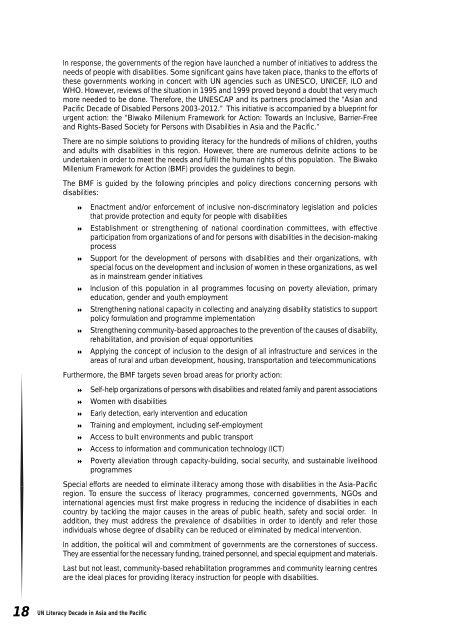The United Nations literacy decade in Asia and the Pacific Progress ...
The United Nations literacy decade in Asia and the Pacific Progress ...
The United Nations literacy decade in Asia and the Pacific Progress ...
You also want an ePaper? Increase the reach of your titles
YUMPU automatically turns print PDFs into web optimized ePapers that Google loves.
In response, <strong>the</strong> governments of <strong>the</strong> region have launched a number of <strong>in</strong>itiatives to address <strong>the</strong><br />
needs of people with disabilities. Some significant ga<strong>in</strong>s have taken place, thanks to <strong>the</strong> efforts of<br />
<strong>the</strong>se governments work<strong>in</strong>g <strong>in</strong> concert with UN agencies such as UNESCO, UNICEF, ILO <strong>and</strong><br />
WHO. However, reviews of <strong>the</strong> situation <strong>in</strong> 1995 <strong>and</strong> 1999 proved beyond a doubt that very much<br />
more needed to be done. <strong>The</strong>refore, <strong>the</strong> UNESCAP <strong>and</strong> its partners proclaimed <strong>the</strong> “<strong>Asia</strong>n <strong>and</strong><br />
<strong>Pacific</strong> Decade of Disabled Persons 2003-2012.” This <strong>in</strong>itiative is accompanied by a bluepr<strong>in</strong>t for<br />
urgent action: <strong>the</strong> “Biwako Millenium Framework for Action: Towards an Inclusive, Barrier-Free<br />
<strong>and</strong> Rights-Based Society for Persons with Disabilities <strong>in</strong> <strong>Asia</strong> <strong>and</strong> <strong>the</strong> <strong>Pacific</strong>.”<br />
<strong>The</strong>re are no simple solutions to provid<strong>in</strong>g <strong>literacy</strong> for <strong>the</strong> hundreds of millions of children, youths<br />
<strong>and</strong> adults with disabilities <strong>in</strong> this region. However, <strong>the</strong>re are numerous def<strong>in</strong>ite actions to be<br />
undertaken <strong>in</strong> order to meet <strong>the</strong> needs <strong>and</strong> fulfill <strong>the</strong> human rights of this population. <strong>The</strong> Biwako<br />
Millenium Framework for Action (BMF) provides <strong>the</strong> guidel<strong>in</strong>es to beg<strong>in</strong>.<br />
<strong>The</strong> BMF is guided by <strong>the</strong> follow<strong>in</strong>g pr<strong>in</strong>ciples <strong>and</strong> policy directions concern<strong>in</strong>g persons with<br />
disabilities:<br />
! Enactment <strong>and</strong>/or enforcement of <strong>in</strong>clusive non-discrim<strong>in</strong>atory legislation <strong>and</strong> policies<br />
that provide protection <strong>and</strong> equity for people with disabilities<br />
! Establishment or streng<strong>the</strong>n<strong>in</strong>g of national coord<strong>in</strong>ation committees, with effective<br />
participation from organizations of <strong>and</strong> for persons with disabilities <strong>in</strong> <strong>the</strong> decision-mak<strong>in</strong>g<br />
process<br />
! Support for <strong>the</strong> development of persons with disabilities <strong>and</strong> <strong>the</strong>ir organizations, with<br />
special focus on <strong>the</strong> development <strong>and</strong> <strong>in</strong>clusion of women <strong>in</strong> <strong>the</strong>se organizations, as well<br />
as <strong>in</strong> ma<strong>in</strong>stream gender <strong>in</strong>itiatives<br />
! Inclusion of this population <strong>in</strong> all programmes focus<strong>in</strong>g on poverty alleviation, primary<br />
education, gender <strong>and</strong> youth employment<br />
! Streng<strong>the</strong>n<strong>in</strong>g national capacity <strong>in</strong> collect<strong>in</strong>g <strong>and</strong> analyz<strong>in</strong>g disability statistics to support<br />
policy formulation <strong>and</strong> programme implementation<br />
! Streng<strong>the</strong>n<strong>in</strong>g community-based approaches to <strong>the</strong> prevention of <strong>the</strong> causes of disability,<br />
rehabilitation, <strong>and</strong> provision of equal opportunities<br />
! Apply<strong>in</strong>g <strong>the</strong> concept of <strong>in</strong>clusion to <strong>the</strong> design of all <strong>in</strong>frastructure <strong>and</strong> services <strong>in</strong> <strong>the</strong><br />
areas of rural <strong>and</strong> urban development, hous<strong>in</strong>g, transportation <strong>and</strong> telecommunications<br />
Fur<strong>the</strong>rmore, <strong>the</strong> BMF targets seven broad areas for priority action:<br />
! Self-help organizations of persons with disabilities <strong>and</strong> related family <strong>and</strong> parent associations<br />
! Women with disabilities<br />
! Early detection, early <strong>in</strong>tervention <strong>and</strong> education<br />
! Tra<strong>in</strong><strong>in</strong>g <strong>and</strong> employment, <strong>in</strong>clud<strong>in</strong>g self-employment<br />
! Access to built environments <strong>and</strong> public transport<br />
! Access to <strong>in</strong>formation <strong>and</strong> communication technology (ICT)<br />
! Poverty alleviation through capacity-build<strong>in</strong>g, social security, <strong>and</strong> susta<strong>in</strong>able livelihood<br />
programmes<br />
Special efforts are needed to elim<strong>in</strong>ate il<strong>literacy</strong> among those with disabilities <strong>in</strong> <strong>the</strong> <strong>Asia</strong>-<strong>Pacific</strong><br />
region. To ensure <strong>the</strong> success of <strong>literacy</strong> programmes, concerned governments, NGOs <strong>and</strong><br />
<strong>in</strong>ternational agencies must first make progress <strong>in</strong> reduc<strong>in</strong>g <strong>the</strong> <strong>in</strong>cidence of disabilities <strong>in</strong> each<br />
country by tackl<strong>in</strong>g <strong>the</strong> major causes <strong>in</strong> <strong>the</strong> areas of public health, safety <strong>and</strong> social order. In<br />
addition, <strong>the</strong>y must address <strong>the</strong> prevalence of disabilities <strong>in</strong> order to identify <strong>and</strong> refer those<br />
<strong>in</strong>dividuals whose degree of disability can be reduced or elim<strong>in</strong>ated by medical <strong>in</strong>tervention.<br />
In addition, <strong>the</strong> political will <strong>and</strong> commitment of governments are <strong>the</strong> cornerstones of success.<br />
<strong>The</strong>y are essential for <strong>the</strong> necessary fund<strong>in</strong>g, tra<strong>in</strong>ed personnel, <strong>and</strong> special equipment <strong>and</strong> materials.<br />
Last but not least, community-based rehabilitation programmes <strong>and</strong> community learn<strong>in</strong>g centres<br />
are <strong>the</strong> ideal places for provid<strong>in</strong>g <strong>literacy</strong> <strong>in</strong>struction for people with disabilities.<br />
18<br />
UN Literacy Decade <strong>in</strong> <strong>Asia</strong> <strong>and</strong> <strong>the</strong> <strong>Pacific</strong>

















